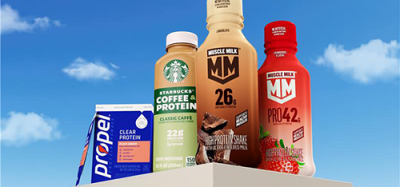Going plant-based
Posted: 20 November 2020 | Carla Hilhorst | No comments yet
A discussion with Unilever’s Carla Hilhorst on the food trend sweeping the world.


The plant-based sector is booming and expected to grow at a CAGR of 11.9 percent from 2020 to 2027, to reach $74.2 billion by 2027.1 In this article, New Food hears from Carla Hilhorst, Unilever’s Executive Vice President of R&D Foods & Refreshment to find out why this multinational consumer goods company is championing plant-based and the work it’s undertaking in this green arena.
Q: Why is Unilever committed to creating plant-based products?
A: The world food system needs to change. Right now, around two billion people are overweight, while nearly a billion go to bed hungry. The food system should be providing everyone with high quality, tasty and affordable food, with a multitude of plant-based options.
On the whole, plant-based proteins are better for us and better for the planet. Many are richer in fibre, vitamins and minerals and help lower blood pressure and cholesterol, reduce the risk of diabetes and heart disease, and help maintain a healthy weight. An unvaried diet restricts us of all these nutrients we need. We also know that many plant-based proteins use less water, less land and produce far fewer carbon emissions than protein from animal agriculture. Innovating in the plant-based space is key for a more sustainable, nutritious and efficient food system.
Q: Tell me about Hive and how it relates to your plant-based offering.
A: Unilever has made a €85 million investment in a new Foods Innovation Centre, called the Hive, at the campus of Wageningen University & Research. This will help formulate the next generation of meat and dairy alternatives.
The global innovation hub in the ‘Foodie Silicon Valley’ has 500 employees working on ‘the food of tomorrow’, focusing on affordability, sustainability and taste with our big brands like Knorr and Hellmann’s.
Q: You’re also developing microalgae in partnership with Algenuity…how did this come about?
A: Our partnership with biotech start-up Algenuity, announced in July, allows us to explore the huge potential of microalgae, a sustainable protein source. We will be able to innovate with future foods for our plant-based portfolio, which currently makes up a third of our wider portfolio. Algenuity will provide the Chlorella ingredients, an algae, for product development by the team in Unilever’s Foods and Refreshment division. This partnership helps us on our path to ensure healthy and nutritious foods can become more accessible.
Q: What benefits can microalgae bring?
A: Chlorella vulgaris is packed with nutrients like vitamins, iron, antioxidants and amino acids, which are crucial for building up a strong immune system. Chlorella is a great source of protein and fibre, with low fat and low sugar content. These alternative proteins also have a low environmental footprint. They can be produced sustainably at a large scale, using an efficient allocation of resources such as energy, fertilisers and water.
Q: Are there products out there using microalgae already, and, in any case, what’s halted its progress so far?
A: For years, microalgae has been used as a health supplement and as a colourful addition to food. So it has been available as a source of nutrition and health for quite some time. However, the algae’s high chlorophyll content means it has a pungently bitter taste and smell. As a result, it has been left out of mainstream diets.
Q: How are you overcoming such challenges?
A: Algenuity’s innovative technology, Chlorella Colours palette, is able to reduce the chlorophyll content in the algae, meaning the protein can become palatable. As well as removing the bitter taste, it also removes the green appearance of the algae. Crucially, this technology does not compromise the microalgae’s natural nutrients. It can remain an efficient and sustainable source of nutrition, that now tastes good and can be incorporated into foods that are 

Maintaining the functionality of the proteins and increasing the relative digestibility and bioavailability of these proteins remains a challenge. Nevertheless, Algenuity is a strong foundation of knowledge in this area; this partnership will likely lead to new innovations and products.
Q: What’s been your proudest achievement in the plant-based arena?
A: We have been expanding our plant-based meat and dairy alternatives business for several years. Since acquiring The Vegetarian Butcher just two years ago, we have rolled out the plant-based meat brand into more than 30 countries, and last year the brand was chosen as the supplier of Burger King’s Plant-Based Whopper and Plant-Based Nuggets across Europe, the Middle East and Africa.
In ice cream, our first vegan Magnum was awarded Best Vegan Ice Cream in the UK by PETA in 2019. Both Hellmann’s Vegan Mayo and Ben & Jerry’s Coconutterly Caramel’d Dairy-free were named as one of Nielsen’s top 25 Breakthrough Innovations in Europe for 2020.
Q: How do you see the plant-based sector evolving in the future?
A: The plant-based market is growing rapidly; it is currently a $14 billion market, according to Euromonitor, and plant-based ‘meat’ sales are set to explode. Barclays estimates that the market could grow by over 1,000 percent over the next 10 years, reaching $140 billion.
COVID-19 has sparked demand for wellness products; consumers are likely to continue to seek out nutritious foods that support their immune system. I expect we will see plant-based foods becoming more mainstream in many people’s diets, as society becomes more conscious of the environmental impact of animal products.
Our partnership with Algenuity is an example of how innovative the plant-based market is and how the food system is constantly evolving. Thanks to technological innovations like these, we can make healthier and plant-based options available and accessible to all.
About the author
Carla Hilhorst is Executive Vice President R&D Foods & Refreshment at Unilever. She graduated as a food scientist at the University of Wageningen in The Netherlands and joined Unilever in 1993, starting as a product developer in the margarine category. She led and implemented a number of R&D innovations in the area of Heart Health margarine products.
After a several years, she became responsible for the Global R&D programme for spread brands like Blue Band, after which she made the step to become responsible for running a global product design centre for margarine, dressings, mayonnaise and dairy. Between 2009-2012 she was responsible for the Regulatory Affairs function within Unilever based in more than 100 countries across the globe.
In 2012 she became the Vice President R&D Foods Europe, and moved to the role of VP R&D for Savoury globally in April 2016 to subsequently become responsible for Foods R&D globally as of January 2018. In Q4 2019 she took over the overall responsibility of Foods, Ice-Cream and Tea R&D within the Foods & Refreshment division in Unilever.
References
Related topics
Environment, New product development (NPD), Plant based, Product Development, Sustainability









